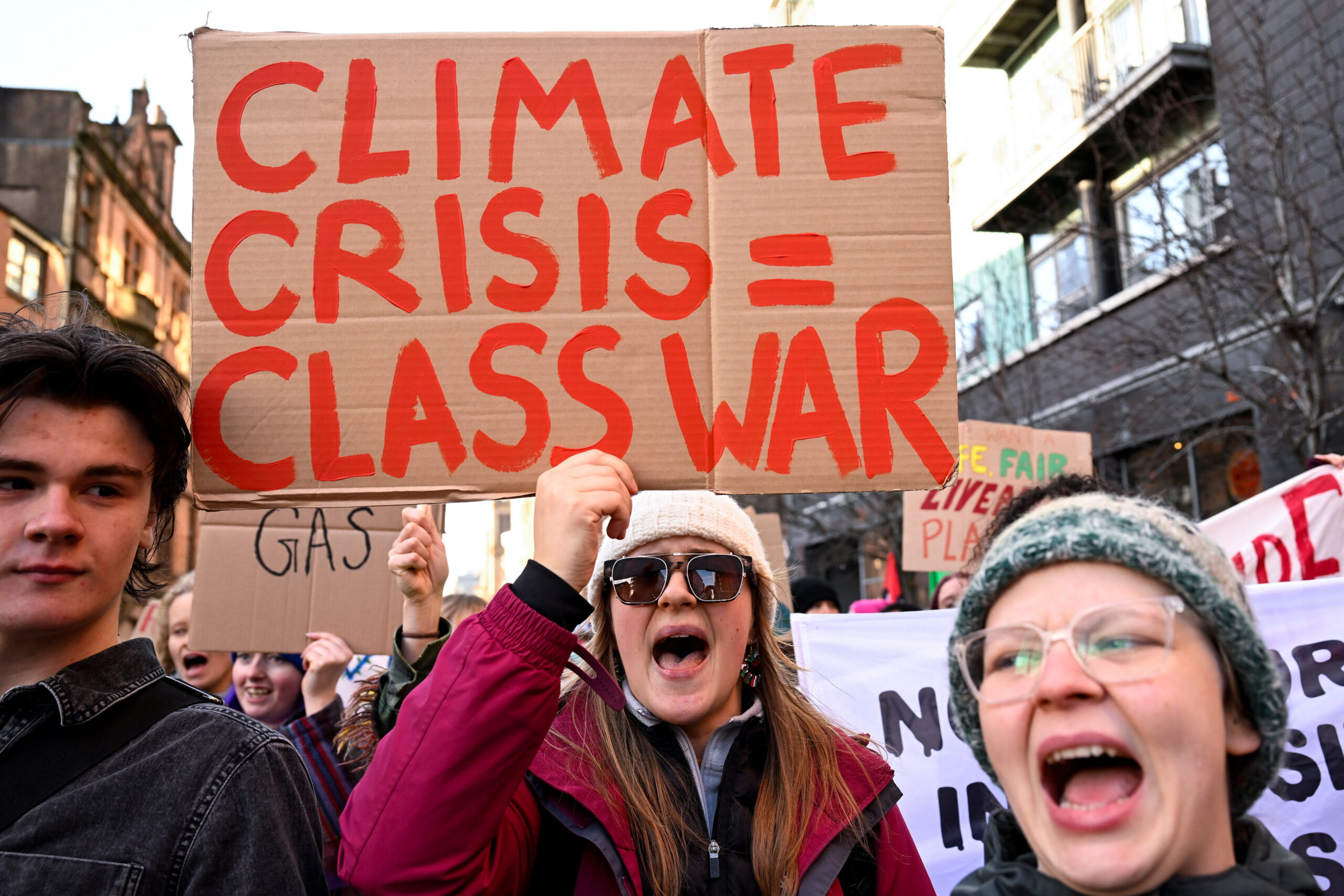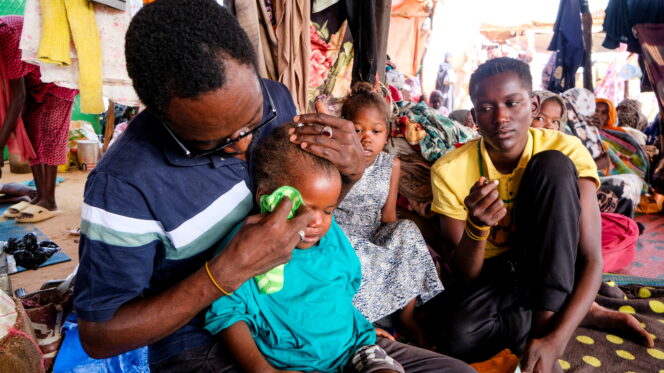Rich People Are Becoming Less Willing to Help With the World’s Problems
Wealthy UK households are particularly reluctant to pay.
by Harriet Williamson
24 November 2025

High-income households in the UK recorded a massive drop in willingness to contribute via taxes to solving global problems, according to new polling shared exclusively with Novara Media.
New Ipsos polling for think tank Global Nation, which studies international cooperation, surveyed more than 22,000 people across 31 countries to assess public global solidarity on three measures: whether people identify as citizens of the world, whether they’re willing to contribute taxes to tackle global problems, and whether they believe international institutions should be empowered to enforce solutions.
The 2025 findings show a broad decline across all three measures, indicating that there will be even greater future challenges when it comes to ensuring people are willing to cooperate on global issues like inequality, pandemic events and the climate crisis.
But in the UK, data was particularly stark regarding wealthy households, defined as those earning from £45k up to £100k or more per year.
In the UK, only 28% of high-income households surveyed in 2025 said they agree their taxes should go towards solving global problems – a huge drop from 41% in 2024.
Low-income UK households (earning £14,999 per year or less) polled in the opposite direction and were actually more likely to agree than last year, while those on medium incomes (between £15,000 and £44,999) have stayed the same. In 2025, 24% of low-income households and 25% of medium-income households agreed their taxes should help address global issues, compared to 21% and 25% in 2024 respectively.
On the statement “I consider myself more a world citizen than a citizen of the country I live in”, 26% of people in the UK agreed, down from 28% in 2024. The biggest declines in support for this statement came from men – 25% in 2025 compared to 30% in 2024 – and high-income households – 31% in 2025 compared to 40% in 2024.
When asked if they agreed that “for certain problems, like environmental pollution, international bodies should have the right to enforce solutions”, 45% of UK respondents agreed, down from 54% last year. The biggest drops in support were again from men – 46% in 2025 compared to 55% in 2024 – and baby boomers – 38% in 2025 down from 54% in 2024.
Global Nation surveyed people in Australia, Brazil, Canada, China, France, Germany, the UK, India, Italy, Japan, Mexico, Spain, the US, Argentina, Belgium, Chile, Colombia, Hungary, Indonesia, Ireland, Malaysia, the Netherlands, Peru, Poland, Saudi Arabia, Singapore, South Africa, South Korea, Sweden, Thailand and Turkey.
What did the global polling find?
Across the 31 countries, the data shows a growing reluctance and active opposition to funding global solutions, with only 31% of people agreeing that their taxes should go towards solving global problems. That’s an 8% decrease in support, and the decline is happening across gender, generation and income level.
Now, 21% of people globally strongly disagree that their taxes should be used to solve global problems – a 15.1% relative increase on last year.
Green energy company Ecotricity founder Dale Vince warned that the polling shows that “we are entering a low-solidarity world” where “our sense of shared purpose and willingness to act for the common good on global problems are in worrying decline”.
The data comes after the most recent Climate Action Tracker (CAT) update found that the world is on track for a catastrophic global heating increase of 2.6C above pre-industrial levels by the end of the century.
The same temperature rise was predicted last year, showing that governments have not taken the steps needed to avert climate catastrophe, and have made little or no measurable progress for the fourth consecutive year. The 2.6C increase would mean “global disaster”, according to CEO of Climate Analytics, Bill Hare. “That all means the end of agriculture in the UK and across Europe, drought and monsoon failure in Asia and Africa, lethal heat and humidity.”
There isn’t much hope to be found in the Cop process either, with all mentions of fossil fuels dropped from the most recent draft proposal to emerge from the negotiations at this month’s climate summit in Brazil. The 11-day summit in Belém has been overrun by fossil fuel lobbyists, significantly outnumbering the delegations of every country except Brazil, and the event hall had to be evacuated when a fire broke out on Thursday.
On the metric of international enforcement for global issues, the data shows declining support. While 53% of those surveyed agreed that “for certain problems, like environmental pollution, international bodies should have the right to enforce solutions”, this represents an 8% decrease in support compared to 2024.
Agreement fell across all age groups, genders, generations and income brackets, with the biggest declines from baby boomers (an 11% decrease in support) and high-income households (a 10% decrease in support).
The polling also found that fewer people around the world feel like global citizens and more are actively rejecting the idea of a global identity. Just 31% agreed with the statement: “I consider myself more a world citizen than a citizen of the country I live in” in 2025 – a 2.9% decrease in support compared to 2024.
This sense of global identity is shrinking fastest among older, wealthier and male respondents, with the biggest declines in the proportion of those agreeing coming from baby boomers (a 7.1% decrease in support), men (a 6.4% decrease in support) and high-income households (a 5.7% decrease in support ).
Global Nation director Hassan Damluji said these sharp drops were “very rare and worrying”.
“Public attitudes to questions like these normally change only slowly, but what we are seeing here in the last year alone is a significant shift,” Damluji told Novara Media. “Our inability to make progress on global challenges – combined with an increasingly divisive information environment – is feeding a downward spiral in public solidarity, and that will make it much harder to solve global problems like climate change, conflict and inequality.”
On the climate emergency specifically, Vince said: “Those who profit from extraction and environmental destruction understand this perfectly. Undermining trust, solidarity and, with it, consensus on tackling climate change is their most effective strategy for preserving wealth and power.
“Today’s information environment makes this terrifyingly easy. Never has it been so simple for the powerful and wealthy to engineer political support for whatever serves their narrow interests. Make no mistake: the far right has turned climate change into a wedge issue not in service of the public, but of their funders who are proving a crucial asset in their quest for power.”
The data will be published in a briefing entitled ‘Global Solidarity in 2025: Trends in Public Opinion’ on 25 November.
Harriet Williamson is a commissioning editor and reporter for Novara Media.


